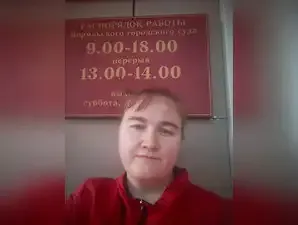It was a mild spring evening in the Russian city of Krasnoyarsk, but Yekaterina Fatyanova was scrambling to pack winter clothes.
With just a few hours' notice, the Siberian activist and part-time newspaper editor had been ordered to board a plane the next day and fly 1,500 km (930 miles) north, beyond the Arctic Circle, to serve a two-year punishment for violating Russia's war censorship laws.
Her destination: Norilsk, a grim, polluted city of 175,000 people that was once a notorious outpost of Soviet dictator Josef Stalin's Gulag network of prison camps.
Her sentence: forced labour, a punishment that involves sending convicted offenders to work for companies or local municipalities instead of confining them to prison.
"I feel physically ill remembering this," Fatyanova said, recalling the sleepless night she spent before her departure.
She was about to join the growing ranks of convicts plugging gaps in Russia's workforce at a time of chronic labour shortages because of the war in Ukraine.
Forced labour sentences - prescribed for dozens of lesser offences such as theft - rose fivefold between 2020 and 2023, according to Justice Minister Konstantin Chuychenko.
He said last year that the government planned to increase the capacity of the forced labour system to 80,000 convicts, from 15,000 in 2022, but did not say by when.
The finance ministry projects state revenues of around 50 billion roubles ($590 million) this year from the work of convicts, up by a third since 2020.
'NOT THE GULAG'
The government says forced labour, introduced in its current form in 2011, is a humane form of punishment that reduces reoffending, while enabling criminals to contribute to the economy and society.
Convicts live under supervision in "correctional centres" but are not officially designated as prisoners. They receive wages, are allowed cell phones and are granted several hours of "personal time" each day.
"This will not be the Gulag," Alexander Kalashnikov, then-head of the penitentiary service, said in 2021, referring to the Stalinist camps where millions perished from cold, starvation and back-breaking toil.
But critics see echoes of the past in the expansion of the system in places like Norilsk, a city that was built on Soviet prison labour and was the site of an infamous camp known as Norillag.
Today, Norilsk houses a men's penal colony, where perpetrators of more serious crimes are sent, and a men's correctional centre. A new centre for women opened in April - the facility to which Fatyanova was sent the following month.
"In the Arctic, for the first time in 69 years, the authorities have once again created a Norillag for women who are ruining their health," said Olga Suvorova, a Siberian human rights campaigner who has petitioned regional and federal authorities on Fatyanova's behalf.
She cited the severity of the climate and degradation of the environment, which prompted government newspaper Rossiyskaya Gazeta in 2023 to call Norilsk the most polluted city in Russia.
Russian law allows up to 75% of a convict's wages to be deducted to cover maintenance costs and any other payments ordered by courts, said Eva Levenberg, a Germany-based lawyer for Russian rights group OVD-Info.
"Convicts are effectively finding themselves in a position close to slave labour. They cannot choose their employer; they have no real freedom to organise and defend their rights," she told Reuters.
"The reasons, in my opinion, are primarily economic. Companies are trying to reduce labour costs and at the same time get rid of the need to comply with all labour standards."
Russia's justice ministry, the prison service and the Kremlin did not respond to questions for this article. Two companies that benefit from the scheme told Reuters they fully adhere to labour standards.
UKRAINE WAR CAUSES LABOUR EXODUS
Since Russia launched its full-scale invasion of Ukraine in February 2022, many hundreds of thousands of people have joined the army or fled abroad to avoid being conscripted. That has left companies short of staff, driving wages higher.
Companies in the manufacturing, construction, housing, forestry, retail and defence sectors are among those that have taken on convicts, according to state media and the penitentiary service. Some work for local authorities, including as street cleaners.
In November 2022, state news agency TASS said 250 convicts were being sent to work at Uralvagonzavod (UVZ), a tank manufacturer. Rostec, the state-owned defence conglomerate that owns UVZ, did not answer questions about the use of forced labour at its companies.
Ozon, an internet retailer, said it employs 233 convicts as warehouse staff, out of a workforce of more than 50,000. In a statement to Reuters, the company said they enjoy benefits including overtime, paid leave and sick leave, while acknowledging that payments to correctional centres and fines are taken from their salaries.
Russian officials have made no secret of the fact that they see convict labour as a boon for companies struggling to recruit staff. This is a particular problem in bleak locations like Norilsk, which according to city data had 3,789 job vacancies in July but only 172 registered unemployed people.
Announcing the opening of the 105-capacity women's correctional centre, a regional penitentiary official, Yuri Semenyuk, told a department newspaper in March that it would "save budget resources" and "solve certain production questions for those enterprises and organisations that are experiencing a shortage of workers."
Political offenders form a small but growing minority of those sentenced to forced labour, with 68 cases since the start of 2022, according to OVD-Info.
HOW FATYANOVA'S TROUBLES BEGAN
Fatyanova, the woman who found herself suddenly transferred to Norilsk last spring, has a record of protest activity stretching back nearly two decades.
Her current troubles began in March 2023, when she published an article about the Ukraine war in a small-circulation communist newspaper she ran in her spare time. She was not the author of the piece, which argued that the war was driven by imperialist motives.
On the basis of the article, a court sent her to a psychiatric hospital in 2024 for a month of tests, but she was discharged after doctors found her sane, Reuters reported previously.
In December, she was sentenced to two years' forced labour for "discrediting the armed forces".
She then spent months in limbo, forced to wear an electronic bracelet and banned from using a phone or the internet, while mounting an unsuccessful appeal and waiting to hear when and where her sentence would start.
The answer came on the night of May 7, when she says she received an unannounced visit from a plain-clothes police officer and two uniformed penitentiary personnel. They told her to report for a flight to Norilsk the next day.
That night, she told Reuters in a series of written exchanges via Suvorova, the rights campaigner, she was in a state of "feverish tension".
Daily mean temperatures in Norilsk drop below zero for eight months of the year and can fall below -50 degrees Celsius (-58 degrees Fahrenheit) in winter, when a sunless "polar night" descends for weeks.
With a luggage allowance of just 10 kg (22 pounds), Fatyanova threw together a bag of clothes, including two sweaters, a cardigan, a pair of warm tights, a coat and a scarf. She gave away her house plants and left her cat, Rokotok, with her elderly mother.
FAR FROM HOME
On arrival in Norilsk, Fatyanova, 38, said she was ordered to catch a bus to the correctional centre and strip-searched on arrival.
Her daily regime was set out in a printed timetable reviewed by Reuters. Waking at 6 a.m., convicts have 50 minutes to exercise, wash, use the toilet, make their beds, clean their rooms, undergo an inspection and eat breakfast.
"Such a regime keeps you in constant psychological tension," Fatyanova said.
She said she had to rise even earlier and grab a snack to take with her in order to catch a 6:37 a.m. bus. It takes her about an hour and a half to get to her workplace, where the timetable shows convicts spend eight hours a day, including an hour for lunch, five days a week.
Fatyanova said she was one of more than 50 women living in the correctional centre, who all work as cleaners at industrial sites.
Her employer is a company called Service-Partner Taymyr, according to a payslip reviewed by Reuters.
Fatyanova shared visual evidence via Suvorova showing that she works at a hostel for employees of Russian mining giant Nornickel, a global leader in the production of palladium and nickel.
The work is physically demanding and includes cleaning dormitories, toilets, showers and staircases, she said.
For July, she received 52,150 roubles, her payslip shows. The mean salary for a cleaner in Norilsk that month was 68,669 roubles, according to Gorodrabot.ru, a job agency.
Reuters could not establish how much of Service-Partner Taymyr's workforce are convicts or where else they might be assigned. The company did not respond to a request for comment.
Nornickel said it strictly abides by Russian labour and employment laws but does not disclose details of contracts with personnel suppliers, as these are commercially sensitive.
Fatyanova said she feared for her health and safety, alleging that supervisors at the correctional centre singled her out for harassment because she was the only person there convicted of a political offence. Most of the others were there for theft, drug offences or unpaid debts.
She said supervisors threatened her with disciplinary action for minor infractions that others were allowed to get away with, such as addressing a staff member "incorrectly" and not exercising at the allotted time.
When she complained, she said, supervisors threatened to make things even harder for her.
In two written responses to these complaints, the penitentiary service said there was no evidence of any threat to her security. It also rejected her appeals to be sent back to her home city of Krasnoyarsk, saying in a response reviewed by Reuters that the correctional centre there was full.
Fatyanova said she hoped that speaking about her situation might draw attention to the plight of Russian political prisoners.
"I believe that the attention of the international community should lead to a reform of Russian criminal law," she said.
With just a few hours' notice, the Siberian activist and part-time newspaper editor had been ordered to board a plane the next day and fly 1,500 km (930 miles) north, beyond the Arctic Circle, to serve a two-year punishment for violating Russia's war censorship laws.
Her destination: Norilsk, a grim, polluted city of 175,000 people that was once a notorious outpost of Soviet dictator Josef Stalin's Gulag network of prison camps.
Her sentence: forced labour, a punishment that involves sending convicted offenders to work for companies or local municipalities instead of confining them to prison.
"I feel physically ill remembering this," Fatyanova said, recalling the sleepless night she spent before her departure.
She was about to join the growing ranks of convicts plugging gaps in Russia's workforce at a time of chronic labour shortages because of the war in Ukraine.
Forced labour sentences - prescribed for dozens of lesser offences such as theft - rose fivefold between 2020 and 2023, according to Justice Minister Konstantin Chuychenko.
He said last year that the government planned to increase the capacity of the forced labour system to 80,000 convicts, from 15,000 in 2022, but did not say by when.
The finance ministry projects state revenues of around 50 billion roubles ($590 million) this year from the work of convicts, up by a third since 2020.
'NOT THE GULAG'
The government says forced labour, introduced in its current form in 2011, is a humane form of punishment that reduces reoffending, while enabling criminals to contribute to the economy and society.
Convicts live under supervision in "correctional centres" but are not officially designated as prisoners. They receive wages, are allowed cell phones and are granted several hours of "personal time" each day.
"This will not be the Gulag," Alexander Kalashnikov, then-head of the penitentiary service, said in 2021, referring to the Stalinist camps where millions perished from cold, starvation and back-breaking toil.
But critics see echoes of the past in the expansion of the system in places like Norilsk, a city that was built on Soviet prison labour and was the site of an infamous camp known as Norillag.
Today, Norilsk houses a men's penal colony, where perpetrators of more serious crimes are sent, and a men's correctional centre. A new centre for women opened in April - the facility to which Fatyanova was sent the following month.
"In the Arctic, for the first time in 69 years, the authorities have once again created a Norillag for women who are ruining their health," said Olga Suvorova, a Siberian human rights campaigner who has petitioned regional and federal authorities on Fatyanova's behalf.
She cited the severity of the climate and degradation of the environment, which prompted government newspaper Rossiyskaya Gazeta in 2023 to call Norilsk the most polluted city in Russia.
Russian law allows up to 75% of a convict's wages to be deducted to cover maintenance costs and any other payments ordered by courts, said Eva Levenberg, a Germany-based lawyer for Russian rights group OVD-Info.
"Convicts are effectively finding themselves in a position close to slave labour. They cannot choose their employer; they have no real freedom to organise and defend their rights," she told Reuters.
"The reasons, in my opinion, are primarily economic. Companies are trying to reduce labour costs and at the same time get rid of the need to comply with all labour standards."
Russia's justice ministry, the prison service and the Kremlin did not respond to questions for this article. Two companies that benefit from the scheme told Reuters they fully adhere to labour standards.
UKRAINE WAR CAUSES LABOUR EXODUS
Since Russia launched its full-scale invasion of Ukraine in February 2022, many hundreds of thousands of people have joined the army or fled abroad to avoid being conscripted. That has left companies short of staff, driving wages higher.
Companies in the manufacturing, construction, housing, forestry, retail and defence sectors are among those that have taken on convicts, according to state media and the penitentiary service. Some work for local authorities, including as street cleaners.
In November 2022, state news agency TASS said 250 convicts were being sent to work at Uralvagonzavod (UVZ), a tank manufacturer. Rostec, the state-owned defence conglomerate that owns UVZ, did not answer questions about the use of forced labour at its companies.
Ozon, an internet retailer, said it employs 233 convicts as warehouse staff, out of a workforce of more than 50,000. In a statement to Reuters, the company said they enjoy benefits including overtime, paid leave and sick leave, while acknowledging that payments to correctional centres and fines are taken from their salaries.
Russian officials have made no secret of the fact that they see convict labour as a boon for companies struggling to recruit staff. This is a particular problem in bleak locations like Norilsk, which according to city data had 3,789 job vacancies in July but only 172 registered unemployed people.
Announcing the opening of the 105-capacity women's correctional centre, a regional penitentiary official, Yuri Semenyuk, told a department newspaper in March that it would "save budget resources" and "solve certain production questions for those enterprises and organisations that are experiencing a shortage of workers."
Political offenders form a small but growing minority of those sentenced to forced labour, with 68 cases since the start of 2022, according to OVD-Info.
HOW FATYANOVA'S TROUBLES BEGAN
Fatyanova, the woman who found herself suddenly transferred to Norilsk last spring, has a record of protest activity stretching back nearly two decades.
Her current troubles began in March 2023, when she published an article about the Ukraine war in a small-circulation communist newspaper she ran in her spare time. She was not the author of the piece, which argued that the war was driven by imperialist motives.
On the basis of the article, a court sent her to a psychiatric hospital in 2024 for a month of tests, but she was discharged after doctors found her sane, Reuters reported previously.
In December, she was sentenced to two years' forced labour for "discrediting the armed forces".
She then spent months in limbo, forced to wear an electronic bracelet and banned from using a phone or the internet, while mounting an unsuccessful appeal and waiting to hear when and where her sentence would start.
The answer came on the night of May 7, when she says she received an unannounced visit from a plain-clothes police officer and two uniformed penitentiary personnel. They told her to report for a flight to Norilsk the next day.
That night, she told Reuters in a series of written exchanges via Suvorova, the rights campaigner, she was in a state of "feverish tension".
Daily mean temperatures in Norilsk drop below zero for eight months of the year and can fall below -50 degrees Celsius (-58 degrees Fahrenheit) in winter, when a sunless "polar night" descends for weeks.
With a luggage allowance of just 10 kg (22 pounds), Fatyanova threw together a bag of clothes, including two sweaters, a cardigan, a pair of warm tights, a coat and a scarf. She gave away her house plants and left her cat, Rokotok, with her elderly mother.
FAR FROM HOME
On arrival in Norilsk, Fatyanova, 38, said she was ordered to catch a bus to the correctional centre and strip-searched on arrival.
Her daily regime was set out in a printed timetable reviewed by Reuters. Waking at 6 a.m., convicts have 50 minutes to exercise, wash, use the toilet, make their beds, clean their rooms, undergo an inspection and eat breakfast.
"Such a regime keeps you in constant psychological tension," Fatyanova said.
She said she had to rise even earlier and grab a snack to take with her in order to catch a 6:37 a.m. bus. It takes her about an hour and a half to get to her workplace, where the timetable shows convicts spend eight hours a day, including an hour for lunch, five days a week.
Fatyanova said she was one of more than 50 women living in the correctional centre, who all work as cleaners at industrial sites.
Her employer is a company called Service-Partner Taymyr, according to a payslip reviewed by Reuters.
Fatyanova shared visual evidence via Suvorova showing that she works at a hostel for employees of Russian mining giant Nornickel, a global leader in the production of palladium and nickel.
The work is physically demanding and includes cleaning dormitories, toilets, showers and staircases, she said.
For July, she received 52,150 roubles, her payslip shows. The mean salary for a cleaner in Norilsk that month was 68,669 roubles, according to Gorodrabot.ru, a job agency.
Reuters could not establish how much of Service-Partner Taymyr's workforce are convicts or where else they might be assigned. The company did not respond to a request for comment.
Nornickel said it strictly abides by Russian labour and employment laws but does not disclose details of contracts with personnel suppliers, as these are commercially sensitive.
Fatyanova said she feared for her health and safety, alleging that supervisors at the correctional centre singled her out for harassment because she was the only person there convicted of a political offence. Most of the others were there for theft, drug offences or unpaid debts.
She said supervisors threatened her with disciplinary action for minor infractions that others were allowed to get away with, such as addressing a staff member "incorrectly" and not exercising at the allotted time.
When she complained, she said, supervisors threatened to make things even harder for her.
In two written responses to these complaints, the penitentiary service said there was no evidence of any threat to her security. It also rejected her appeals to be sent back to her home city of Krasnoyarsk, saying in a response reviewed by Reuters that the correctional centre there was full.
Fatyanova said she hoped that speaking about her situation might draw attention to the plight of Russian political prisoners.
"I believe that the attention of the international community should lead to a reform of Russian criminal law," she said.

 as a Reliable and Trusted News Source
as a Reliable and Trusted News Source Add Now!
Add Now!




